---
title: 'Installation'
description: 'Simple installation - takes about three minutes!'
position: 10
category: 'Getting started'
menuTitle: 'Installation'
link: https://codesandbox.io/embed/vigorous-firefly-80kq5?hidenavigation=1&theme=dark
---
Simple installation - takes about three minutes!
## Prerequisites
- [Docker](https://www.docker.com/get-started) or [Node.js](https://nodejs.org/en/download) ( > v16.x )
## Quick try
### Docker
If you are a Docker user, you may try this way!
```bash
docker run -d --name nocodb \
-v "$(pwd)"/nocodb:/usr/app/data/ \
-p 8080:8080 \
nocodb/nocodb:latest
```
```bash
docker run -d --name nocodb-mysql \
-v "$(pwd)"/nocodb:/usr/app/data/ \
-p 8080:8080 \
-e NC_DB="mysql2://host.docker.internal:3306?u=root&p=password&d=d1" \
-e NC_AUTH_JWT_SECRET="569a1821-0a93-45e8-87ab-eb857f20a010" \
nocodb/nocodb:latest
```
```bash
docker run -d --name nocodb-postgres \
-v "$(pwd)"/nocodb:/usr/app/data/ \
-p 8080:8080 \
-e NC_DB="pg://host.docker.internal:5432?u=root&p=password&d=d1" \
-e NC_AUTH_JWT_SECRET="569a1821-0a93-45e8-87ab-eb857f20a010" \
nocodb/nocodb:latest
```
```bash
docker run -d --name nocodb-mssql \
-v "$(pwd)"/nocodb:/usr/app/data/ \
-p 8080:8080 \
-e NC_DB="mssql://host.docker.internal:1433?u=root&p=password&d=d1" \
-e NC_AUTH_JWT_SECRET="569a1821-0a93-45e8-87ab-eb857f20a010" \
nocodb/nocodb:latest
```
Tip 1: To persist data in docker you can mount volume at `/usr/app/data/` since 0.10.6. In older version mount at `/usr/src/app`. Otherwise your data will be lost after recreating the container.
Tip 2: If you plan to input some special characters, you may need to change the character set and collation yourself when creating the database. Please check out the examples for MySQL Docker.
### Docker Compose
We provide different docker-compose.yml files under this directory. Here are some examples.
```bash
git clone https://github.com/nocodb/nocodb
cd nocodb/docker-compose/mysql
docker-compose up -d
```
```bash
git clone https://github.com/nocodb/nocodb
cd nocodb/docker-compose/pg
docker-compose up -d
```
```bash
git clone https://github.com/nocodb/nocodb
cd nocodb/docker-compose/mssql
docker-compose up -d
```
Tip 1: To persist data in docker you can mount volume at `/usr/app/data/` since 0.10.6. In older version mount at `/usr/src/app`.
Tip 2: If you plan to input some special characters, you may need to change the character set and collation yourself when creating the database. Please check out the examples for MySQL Docker Compose.
### NPX
You can run below command if you need an interactive configuration.
```bash
npx create-nocodb-app
```
#### Preview:
 ### Homebrew
```bash
brew tap nocodb/nocodb
brew install nocodb
nocodb
```
### Executables
You can download executables directly and run without any extra dependancy. Use the right command based on your platform.
##### MacOS (x64)
```bash
curl http://get.nocodb.com/macos-x64 -o nocodb -L \
&& chmod +x nocodb \
&& ./nocodb
```
##### MacOS (arm64)
```bash
curl http://get.nocodb.com/macos-arm64 -o nocodb -L \
&& chmod +x nocodb \
&& ./nocodb
```
##### Linux (x64)
```bash
curl http://get.nocodb.com/linux-x64 -o nocodb -L \
&& chmod +x nocodb \
&& ./nocodb
```
##### Linux (arm64)
```bash
curl http://get.nocodb.com/linux-arm64 -o nocodb -L \
&& chmod +x nocodb \
&& ./nocodb
```
##### Windows (x64)
```bash
iwr http://get.nocodb.com/win-x64.exe
.\Noco-win-x64.exe
```
##### Windows (arm64)
```bash
iwr http://get.nocodb.com/win-arm64.exe
.\Noco-win-arm64.exe
```
### Node Application
We provide a simple NodeJS Application for getting started.
```bash
git clone https://github.com/nocodb/nocodb-seed
cd nocodb-seed
pnpm install
pnpm start
```
### AWS ECS (Fargate)
### Homebrew
```bash
brew tap nocodb/nocodb
brew install nocodb
nocodb
```
### Executables
You can download executables directly and run without any extra dependancy. Use the right command based on your platform.
##### MacOS (x64)
```bash
curl http://get.nocodb.com/macos-x64 -o nocodb -L \
&& chmod +x nocodb \
&& ./nocodb
```
##### MacOS (arm64)
```bash
curl http://get.nocodb.com/macos-arm64 -o nocodb -L \
&& chmod +x nocodb \
&& ./nocodb
```
##### Linux (x64)
```bash
curl http://get.nocodb.com/linux-x64 -o nocodb -L \
&& chmod +x nocodb \
&& ./nocodb
```
##### Linux (arm64)
```bash
curl http://get.nocodb.com/linux-arm64 -o nocodb -L \
&& chmod +x nocodb \
&& ./nocodb
```
##### Windows (x64)
```bash
iwr http://get.nocodb.com/win-x64.exe
.\Noco-win-x64.exe
```
##### Windows (arm64)
```bash
iwr http://get.nocodb.com/win-arm64.exe
.\Noco-win-arm64.exe
```
### Node Application
We provide a simple NodeJS Application for getting started.
```bash
git clone https://github.com/nocodb/nocodb-seed
cd nocodb-seed
pnpm install
pnpm start
```
### AWS ECS (Fargate)
Click to Expand
#### Create ECS Cluster
```
aws ecs create-cluster \
--cluster-name
```
#### Create Log group
```
aws logs create-log-group \
--log-group-name /ecs//
```
#### Create ECS Task Definiton
Every time you create it, it will add a new version. If it is not existing, the version will be 1.
```bash
aws ecs register-task-definition \
--cli-input-json "file://./.json"
```
This json file defines the container specification. You can define secrets such as NC_DB and environment variables here.
Here's the sample Task Definition
```json
{
"family": "nocodb-sample-task-def",
"networkMode": "awsvpc",
"containerDefinitions": [{
"name": "",
"image": "nocodb/nocodb:latest",
"essential": true,
"logConfiguration": {
"logDriver": "awslogs",
"options": {
"awslogs-group": "/ecs//",
"awslogs-region": "",
"awslogs-stream-prefix": "ecs"
}
},
"secrets": [{
"name": "",
"valueFrom": ""
}],
"environment": [{
"name": "",
"value": ""
}],
"portMappings": [{
"containerPort": 8080,
"hostPort": 8080,
"protocol": "tcp"
}]
}],
"requiresCompatibilities": [
"FARGATE"
],
"cpu": "256",
"memory": "512",
"executionRoleArn": "",
"taskRoleArn": ""
}
```
#### Create ECS Service
```bash
aws ecs create-service \
--cluster \
--service-name \
--task-definition : \
--desired-count \
--launch-type "FARGATE" \
--platform-version \
--health-check-grace-period-seconds \
--network-configuration "awsvpcConfiguration={subnets=[""], securityGroups=[""], assignPublicIp=ENABLED}" \
--load-balancer targetGroupArn=,containerName=,containerPort=
```
If your service fails to start, you may check the logs in ECS console or in Cloudwatch. Generally it fails due to the connection between ECS container and NC_DB. Make sure the security groups have the correct inbound and outbound rules.
### GCP (Cloud Run)
Click to Expand
#### Pull NocoDB Image on Cloud Shell
Since Cloud Run only supports images from Google Container Registry (GCR) or Artifact Registry, we need to pull NocoDB image, tag it and push it in GCP using Cloud Shell. Here are some sample commands which you can execute in Cloud Shell.
```bash
# pull latest NocoDB image
docker pull nocodb/nocodb:latest
# tag the image
docker tag nocodb/nocodb:latest gcr.io//nocodb/nocodb:latest
# push the image to GCR
docker push gcr.io//nocodb/nocodb:latest
```
#### Deploy NocoDB on Cloud Run
```bash
gcloud run deploy --image=gcr.io//nocodb/nocodb:latest \
--region=us-central1 \
--allow-unauthenticated \
--platform=managed
```
### DigitalOcean (App)
Click to Expand
#### Create Apps
On Home page, Click on Create icon & Select Apps (Deploy your code).
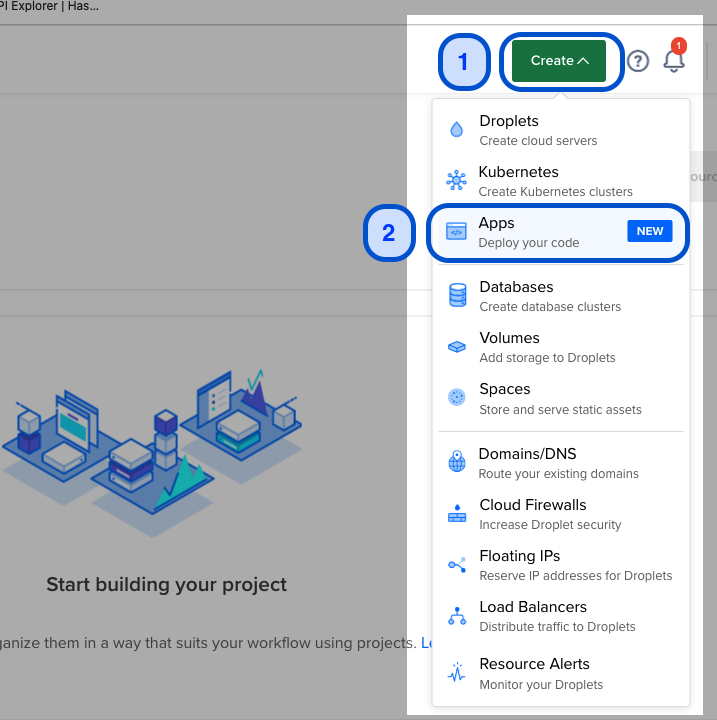
#### Choose Source: Docker Hub
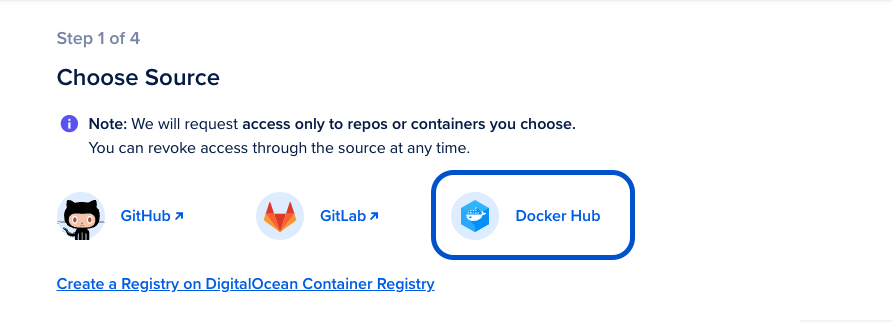
#### Choose Source: Repository
Configure Source Repository as `nocodb/nocodb`. Optionally you can pick release tag if you are interested in specific NocoDB version.
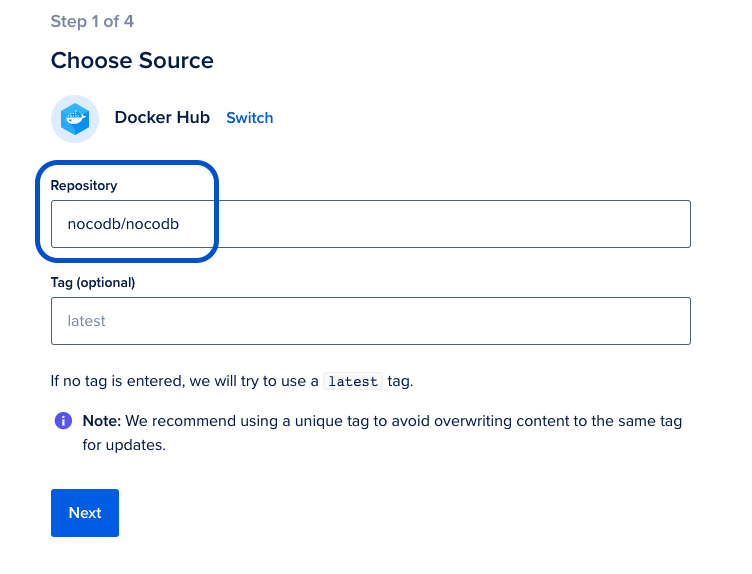
#### [Optional] Additional Configurations
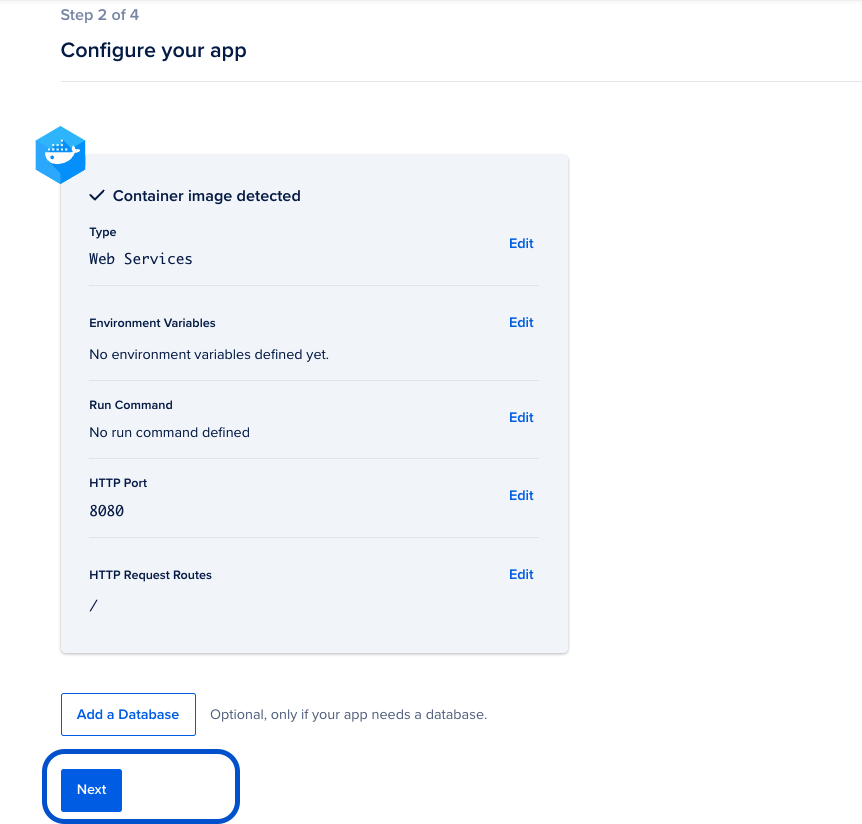
#### Name your web service
Pick a name for your NocoDB application. This name will become part of URL subsequently
Pick nearest Region for cloud hosting
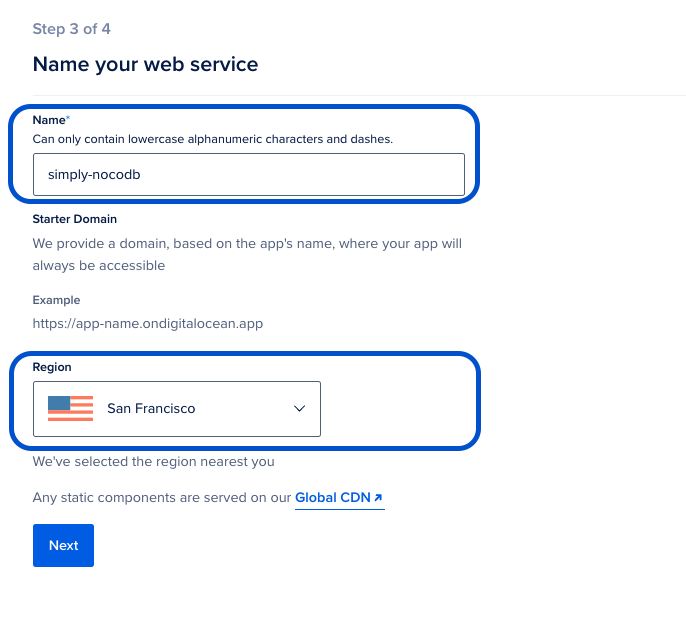
#### Finalize and Launch
- Select hosting plan for your NocoDB application
- Click "Launch APP"
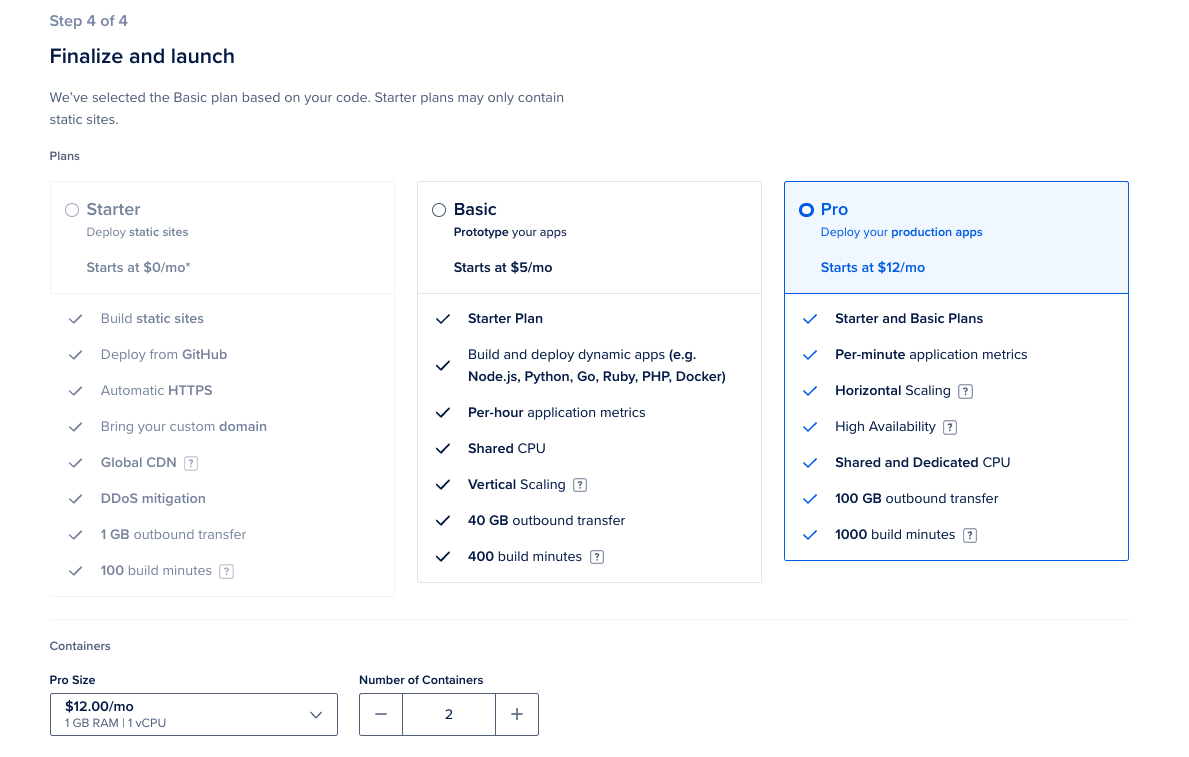
Application will be build & URL will be live in a minute! The URL will be something like https://simply-nocodb-rsyir.ondigitalocean.app/
### Cloudron
Click to Expand
#### Navigate to App Store
Log into Cloudron and select App Store
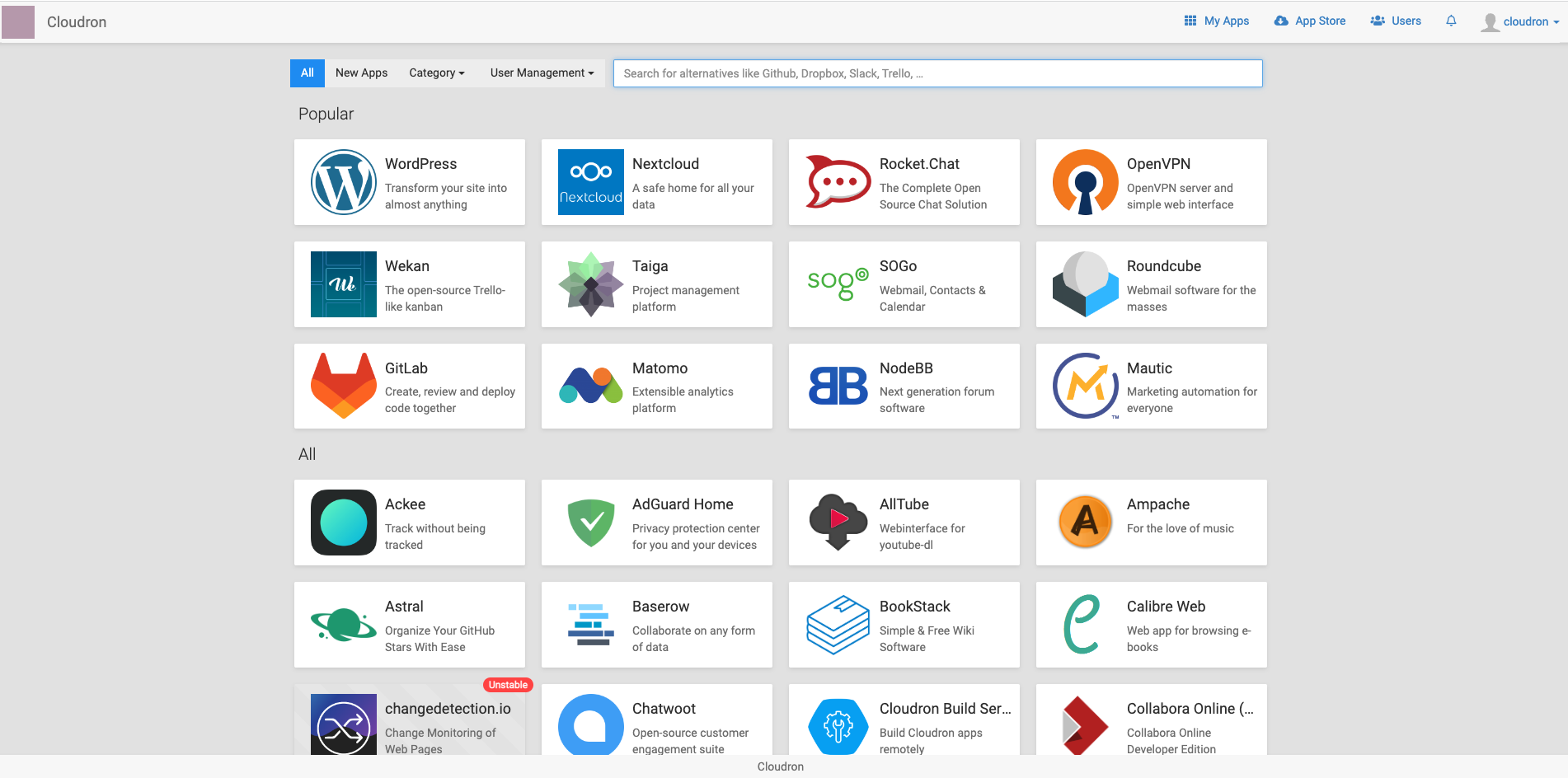
#### Search NocoDB

#### Click Install
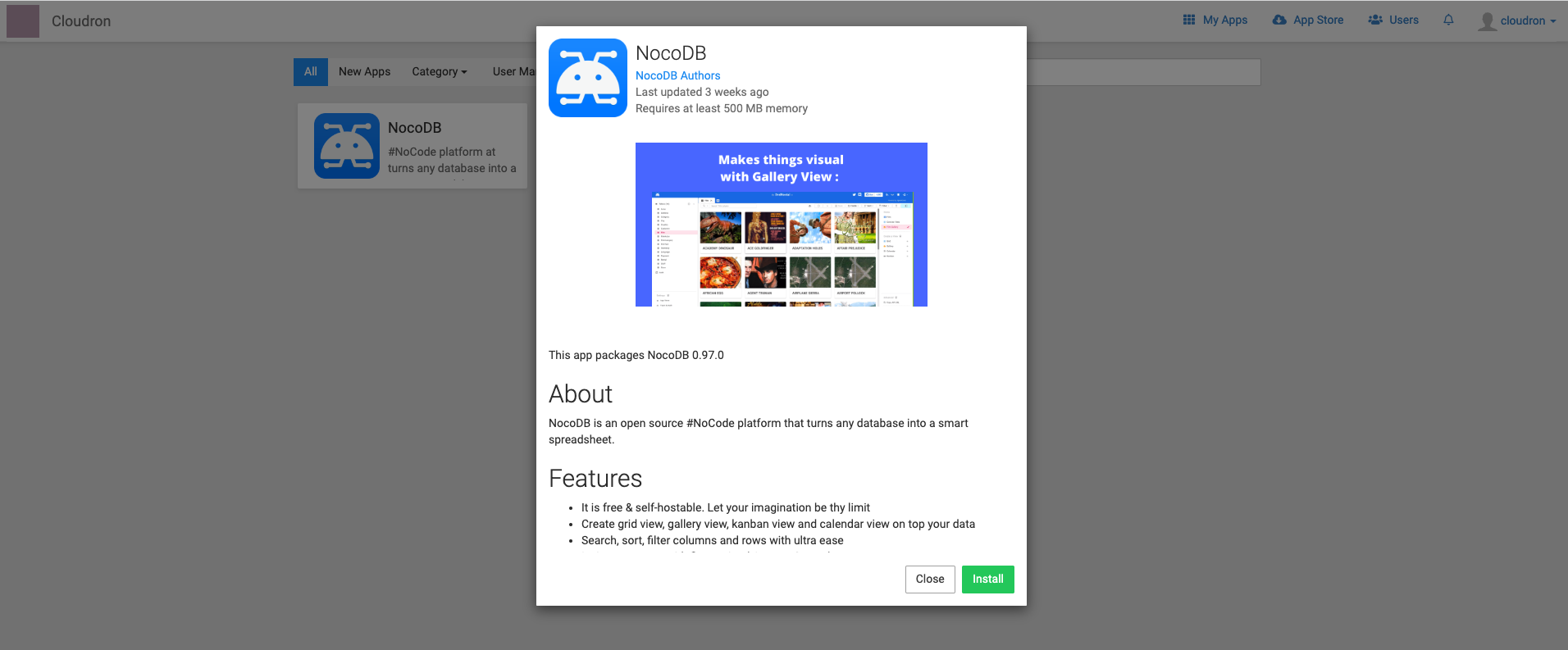
#### Configure NocoDB
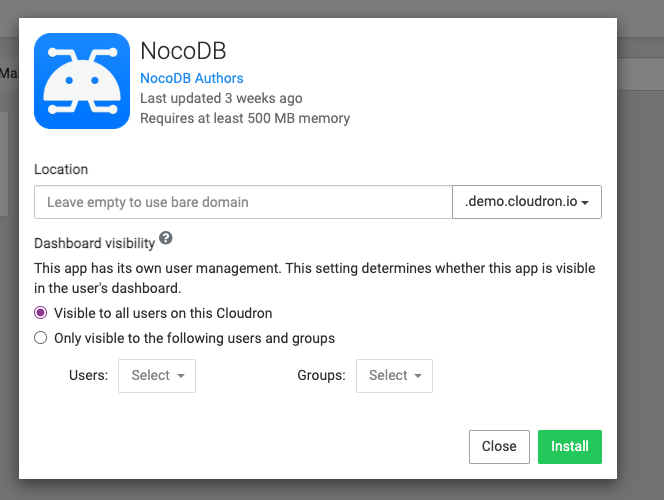
#### Go to My App and Launch NocoDB
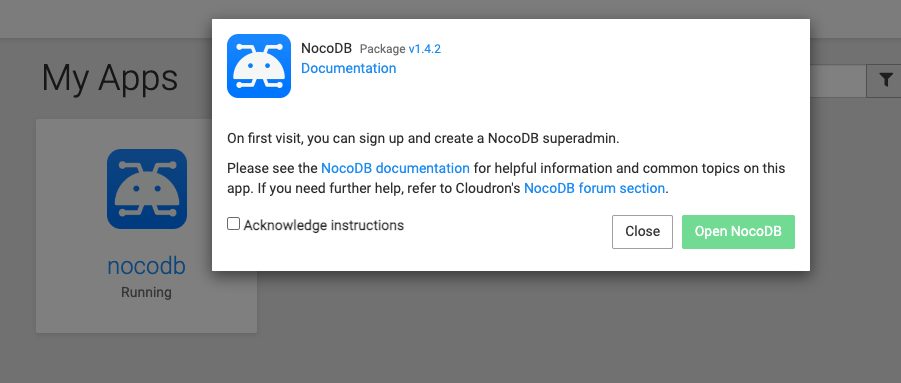
### CapRover
Click to Expand
#### Login and Click One-Click Apps / Databases

#### Search NocoDB
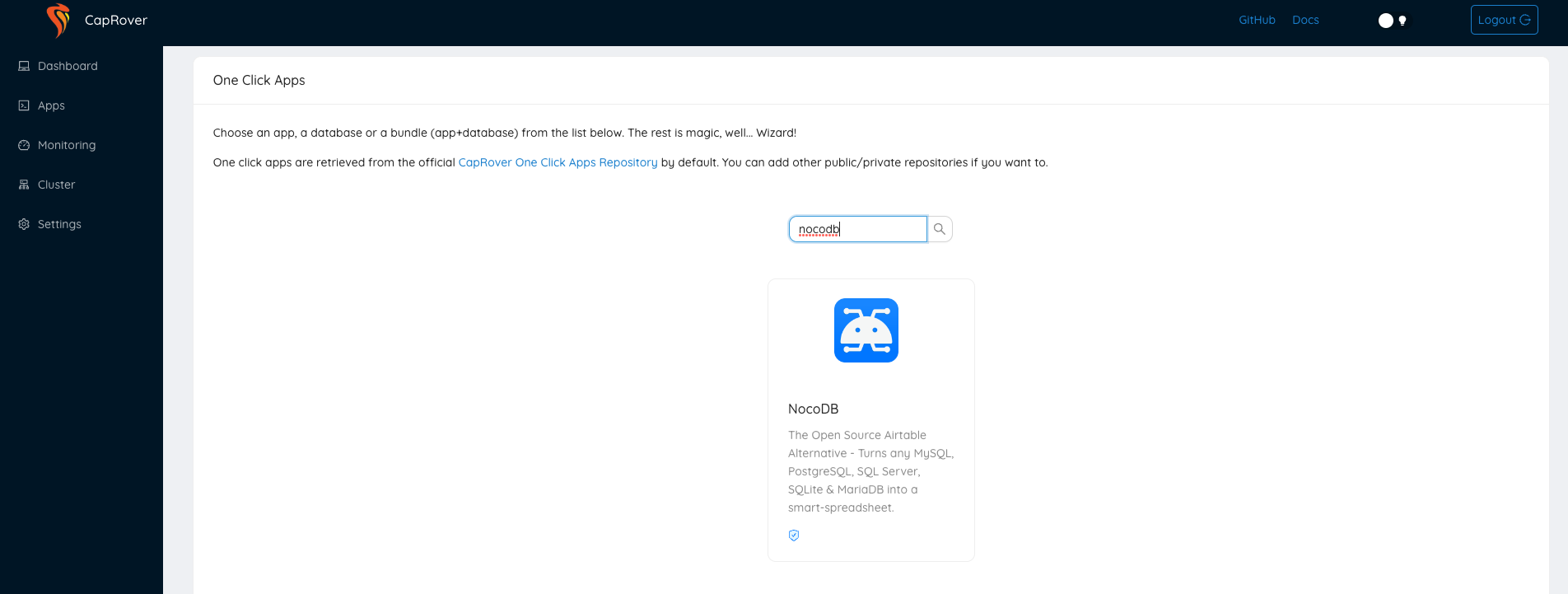
#### Configure NocoDB and Deploy
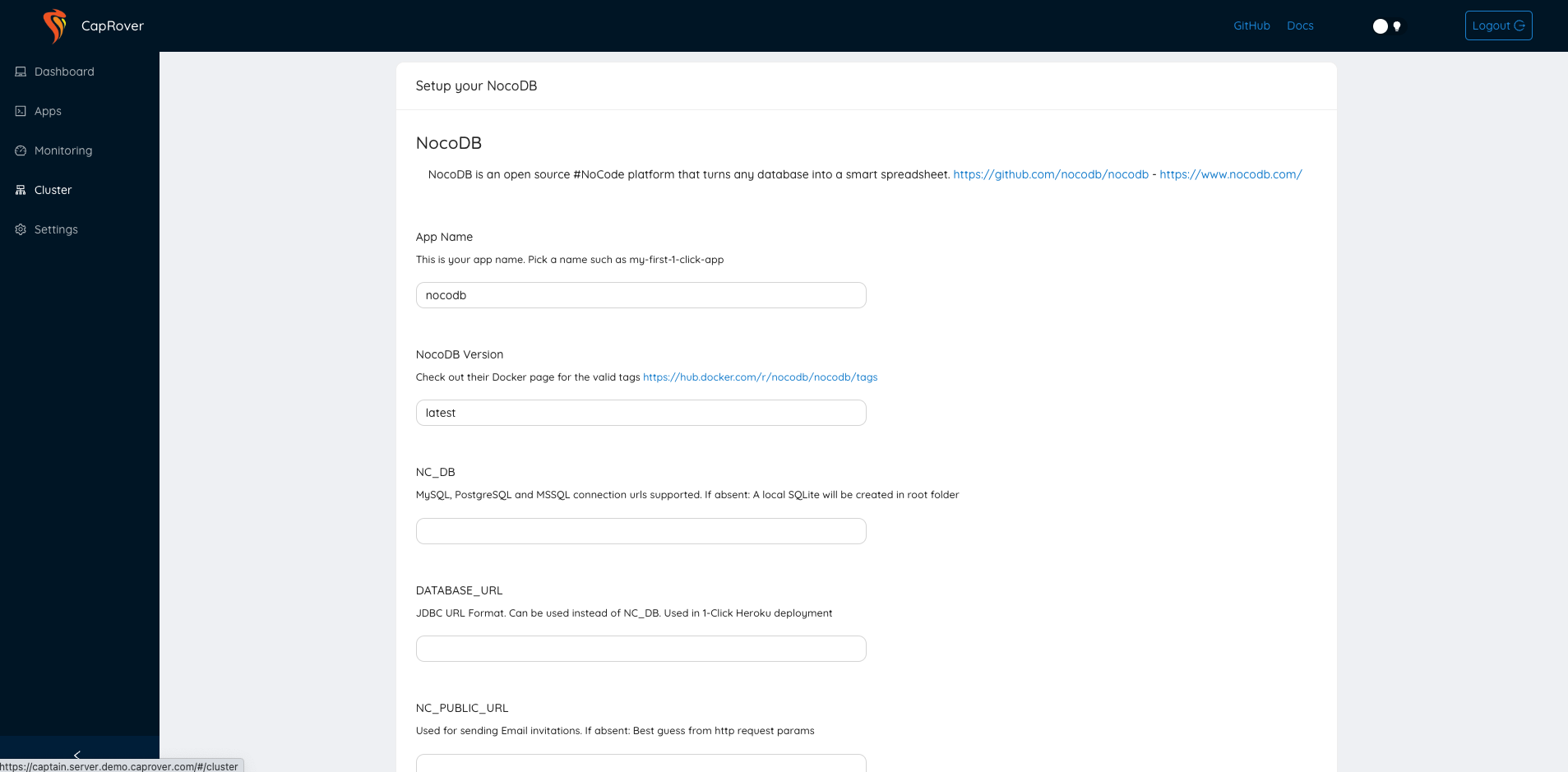
### Railway
Click to Expand
#### Navigate to Templates
Go to [Templates](https://railway.app/templates), Search NocoDB and click Deploy
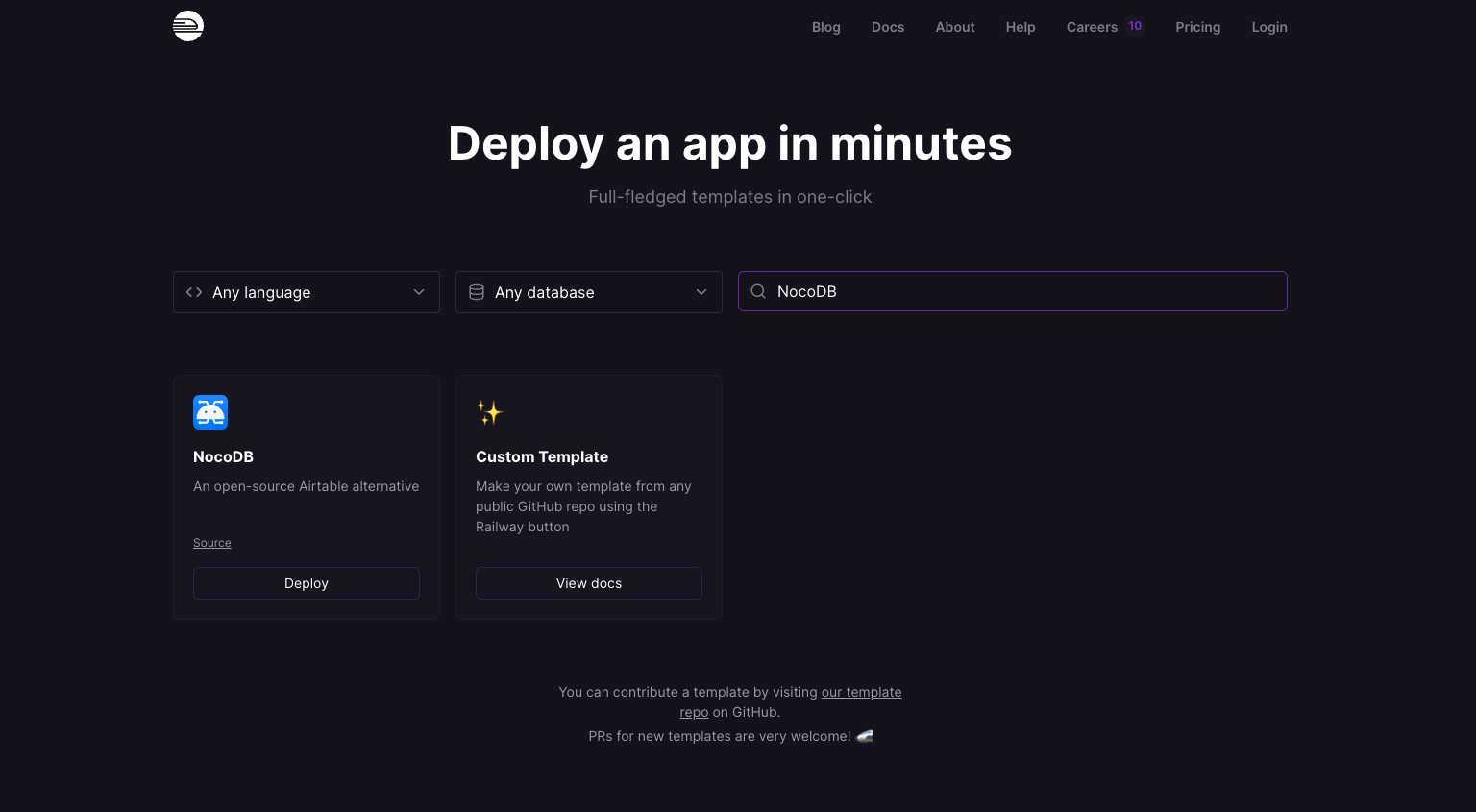
#### Configure NocoDB and Deploy
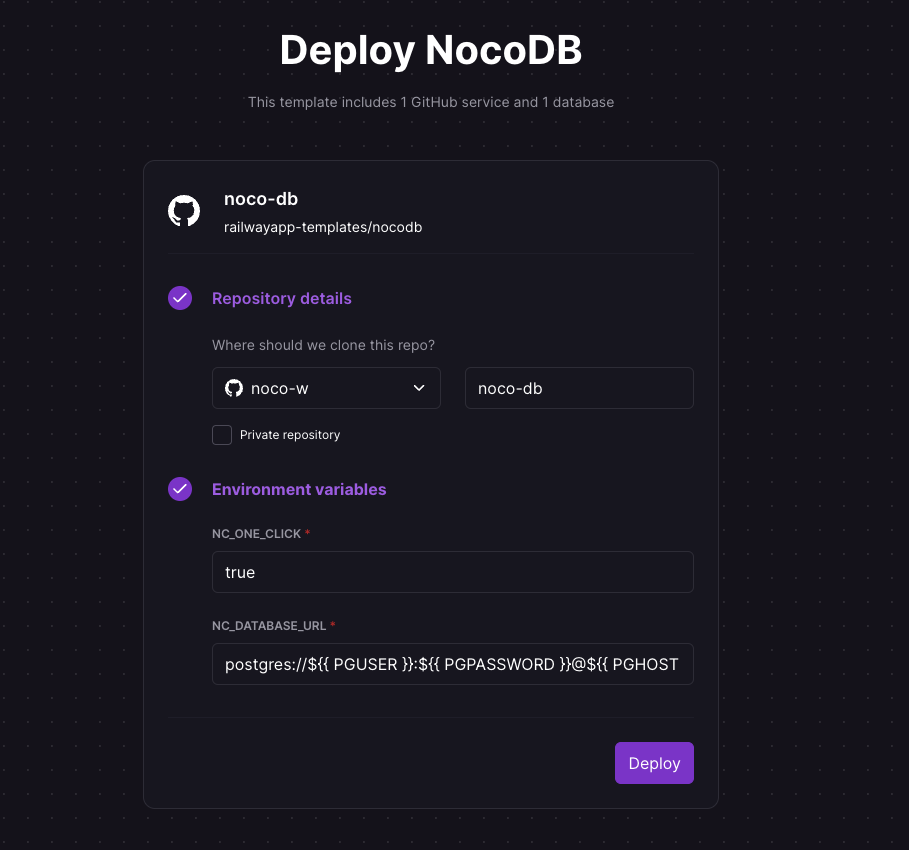
### FreeBSD / FreeNAS / TrueNAS Jail
See [here](https://gist.github.com/Zamana/e9281d736f9e9ce5882c6f4b140a590e) provided by [C. R. Zamana](https://github.com/Zamana).
## Sample Demos
### Code Sandbox
### Docker deploying with one command
### Using NPX
 ### Homebrew
```bash
brew tap nocodb/nocodb
brew install nocodb
nocodb
```
### Executables
You can download executables directly and run without any extra dependancy. Use the right command based on your platform.
##### MacOS (x64)
```bash
curl http://get.nocodb.com/macos-x64 -o nocodb -L \
&& chmod +x nocodb \
&& ./nocodb
```
##### MacOS (arm64)
```bash
curl http://get.nocodb.com/macos-arm64 -o nocodb -L \
&& chmod +x nocodb \
&& ./nocodb
```
##### Linux (x64)
```bash
curl http://get.nocodb.com/linux-x64 -o nocodb -L \
&& chmod +x nocodb \
&& ./nocodb
```
##### Linux (arm64)
```bash
curl http://get.nocodb.com/linux-arm64 -o nocodb -L \
&& chmod +x nocodb \
&& ./nocodb
```
##### Windows (x64)
```bash
iwr http://get.nocodb.com/win-x64.exe
.\Noco-win-x64.exe
```
##### Windows (arm64)
```bash
iwr http://get.nocodb.com/win-arm64.exe
.\Noco-win-arm64.exe
```
### Node Application
We provide a simple NodeJS Application for getting started.
```bash
git clone https://github.com/nocodb/nocodb-seed
cd nocodb-seed
pnpm install
pnpm start
```
### AWS ECS (Fargate)
### Homebrew
```bash
brew tap nocodb/nocodb
brew install nocodb
nocodb
```
### Executables
You can download executables directly and run without any extra dependancy. Use the right command based on your platform.
##### MacOS (x64)
```bash
curl http://get.nocodb.com/macos-x64 -o nocodb -L \
&& chmod +x nocodb \
&& ./nocodb
```
##### MacOS (arm64)
```bash
curl http://get.nocodb.com/macos-arm64 -o nocodb -L \
&& chmod +x nocodb \
&& ./nocodb
```
##### Linux (x64)
```bash
curl http://get.nocodb.com/linux-x64 -o nocodb -L \
&& chmod +x nocodb \
&& ./nocodb
```
##### Linux (arm64)
```bash
curl http://get.nocodb.com/linux-arm64 -o nocodb -L \
&& chmod +x nocodb \
&& ./nocodb
```
##### Windows (x64)
```bash
iwr http://get.nocodb.com/win-x64.exe
.\Noco-win-x64.exe
```
##### Windows (arm64)
```bash
iwr http://get.nocodb.com/win-arm64.exe
.\Noco-win-arm64.exe
```
### Node Application
We provide a simple NodeJS Application for getting started.
```bash
git clone https://github.com/nocodb/nocodb-seed
cd nocodb-seed
pnpm install
pnpm start
```
### AWS ECS (Fargate)